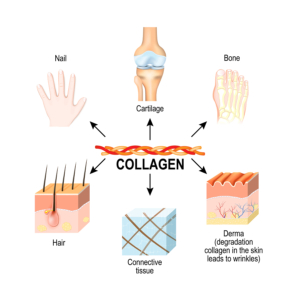Supplement: Collagen Peptides
of Supplement: Collagen Peptides
Collagen supplements seem to be all the rage lately. They come in pills and powders and seem to promote everything from great skin to regulated digestion. In fact, the current tread is to mix your collagen peptides with your morning coffee or tea.
But are collagen peptide supplements worth it?
We break down the science for you.
What is collagen?
Before we begin discussing collagen peptides, we must first understand collagen and it’s importance in the body.
Collagen is the most abundant protein in the body and is the building block (amino acids) of muscle, bone, tendons, ligaments and skin. Collagen aids in skin health and maintaining elasticity and hydration. Additionally, collagen plays a role in slowing the aging process of skin and stimulating production of collagen in the body.
Food sources of collagen include connective tissue of animals and gelatin (hello, Jello!). Nutrients that aid absorption of collagen include vitamin C, proline, glycine and copper.
Conversely, things that can damage collagen include UV radiation (wear your sunscreen!), smoking and refined sugar and carbohydrates.
Collagen amino acid profile
- glycine=improves sleep quality, it may be beneficial (to sleep) to take your collagen peptides at night with some magnesium
- proline
- hydroxyproline
- arginine= needed for protein synthesis, mixed results as to it’s effectiveness for exercise performance
- **it does not contain leucine making it inferior to whey protein and essential amino acids (EAAs) for muscle building capacity
Research, benefits & bias of Collagen
Some studies suggest a benefit of collagen on skin health. But most of these studies were on animals like mice, rats and pigs.
One study investigated the affect of collagen from bovine (cow) bone on aging skin in chronologically aged mice. Researchers demonstrated a significant improvement in skin laxity, increased collagen content, improved antioxidant enzyme activity of skin and repaired collagen fibers. However, there was no effect on skin moisture or hyaluronic acid (HLA) content.
Other proposed benefits of collagen include both joint and gut health. Researchers studied the affect of a daily dose of 40 mg of collagen in osteoarthritic (OA) patients. OA patients reported improvements in pain however, researchers were unclear as to wether the collagen supplementation helped the participants’ joints or if it reduced inflammation which led to improvements in sysmtpoms. More research is warranted however, there is enough promising research for those with OA to try supplementation. Collagen’s proposed benefits on gut health are due to collagen’s structural properties. Therefore, collagen may help support the protective lining of your intestines
Many of the studies conducted on humans are funded by supplement companies who sell collagen. While it’s difficult to find unbiased research, be sure to choose your supplements based on multiple, well-conducted studies (like double-blind studies on humans).
Your body is in charge
Unfortunately, we have no control over “where” our bodies “put” the collagen (or any other amino acid, for that matter) we ingest.
So if you’re taking collagen for longer hair or fewer face wrinkles, there’s no way to “control” how those collagen proteins are directed. Your body will use them wherever they’re needed. However, it’s unlikely to harm you!
Bottom line
Some research has shown benefits of collagen ingestion for skin, joint and gut health however, more research is necessary.
If you are going to supplement with collagen peptides, we suggest this one. Purchase via Fullscript, where our clients get 15% off!
Or you can make your own collagen by making bone broth.
Do you need collagen?
Our nutritionists can help. Work with us here.




